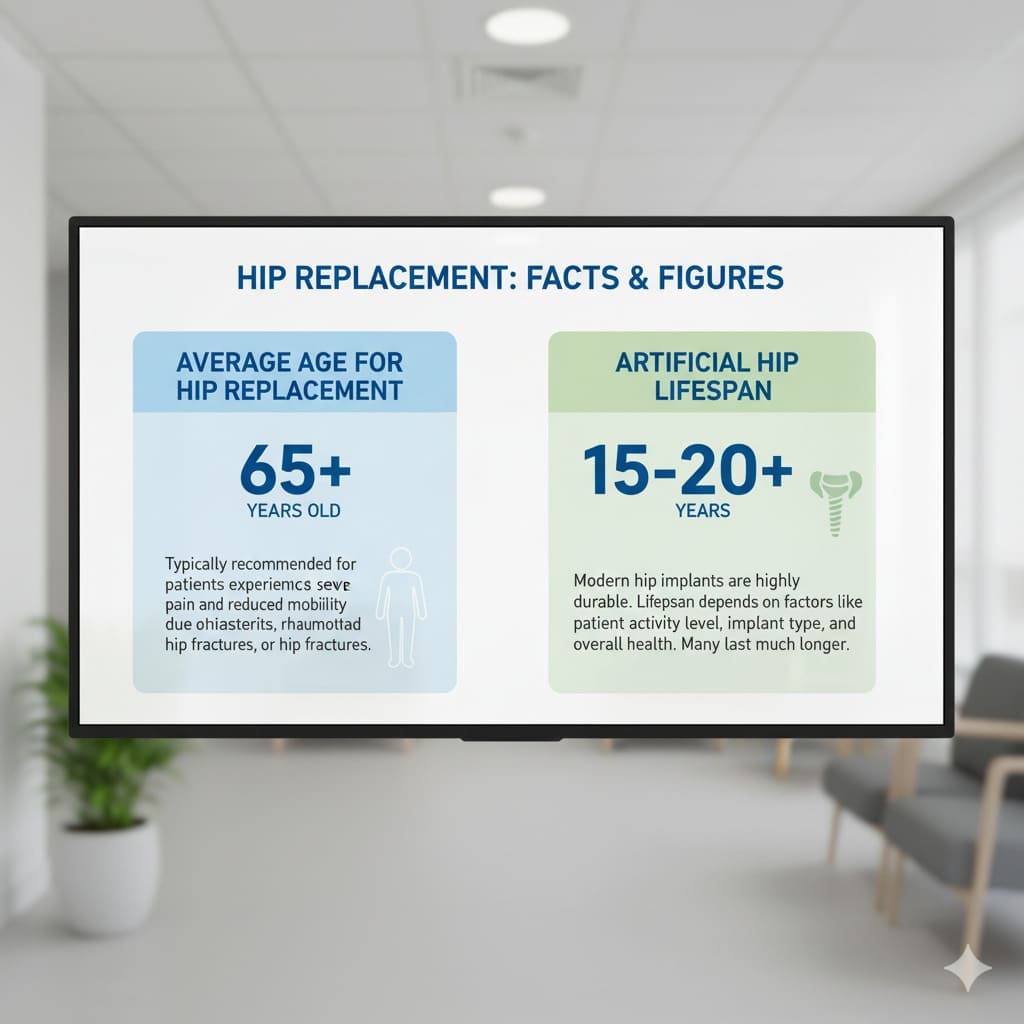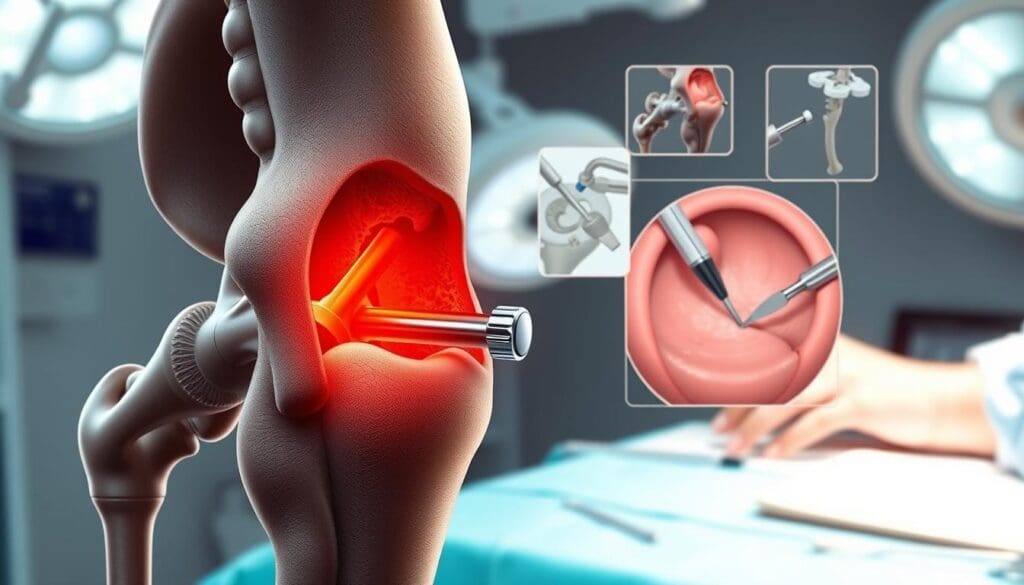
Choosing the best time for hip replacement surgery is tough. At Liv Hospital, we help you make a smart choice about the ideal age for hip replacement. Our team is here to support you, combining our expertise with new solutions for your recovery.
The surgery is often considered from age 50 and up. There’s no limit on how old you can be. Knowing what makes hip replacement successful is key. We’re here to guide you, making sure you get care that fits your needs.
Key Takeaways
- Understanding the ideal age for hip replacement surgery is key for success.
- Your health and lifestyle affect when the best time for surgery is.
- Liv Hospital offers full care and support for international patients needing hip replacement.
- Our team creates personalized treatment plans for each patient.
- New medical tech has made hip replacement recovery better and longer-lasting.
Understanding Hip Replacement Surgery: A Complete Overview

Hip replacement surgery has changed a lot over the years. It now uses new techniques and methods. It’s important to know the basics, how it has evolved, and the new ways it helps patients.
What Is Total Hip Replacement?
Total hip replacement, or hip arthroplasty, is a surgery. It replaces a damaged or arthritic hip with an artificial one. This helps patients with severe pain and loss of mobility.
The artificial joint has three parts: the socket, ball, and stem. These parts work together. They help the patient move like they did before the surgery.
The Evolution of Hip Replacement Procedures
Hip replacement surgery has a long history. The first surgeries were in the early 20th century. But, the modern version started in the 1960s by Sir John Charnley.
Today, there are many types of prosthetics and ways to fix them. The choice depends on the patient’s age, bone quality, and lifestyle.
Modern Surgical Approaches and Techniques
Now, hip replacement surgery uses many approaches and techniques. Minimally invasive surgery and computer-assisted navigation are some of the modern methods. They make the surgery more precise and successful.
Surgeons can choose from different approaches. Each has its own benefits and considerations. The choice depends on the patient’s body, the surgeon’s skills, and what the patient needs.
Hip replacement surgery is a complex field. It offers hope and relief to many. Knowing the basics, its history, and the new techniques is key for making good health decisions.
The Relationship Between Hip Replacement Age and Surgical Outcomes

Age is important in hip replacement surgery, but it’s not everything. When we look at how well surgery goes, we must think about age and other health factors together.
How Age Factors Into Surgical Decisions
Surgeons look at age when deciding if hip replacement is right for a patient. But, how well a person is doing physically is more important than just their age.
For example, a young person with bad hip arthritis might get surgery if they’re healthy. But, an older person with many health problems might not get surgery because of the risks.
Statistical Success Rates Across Age Groups
Research shows different success rates for hip replacement by age. People in their 60s and 70s usually do well because they’re often healthier and less likely to need another surgery soon.
| Age Group | Success Rate | Complication Rate |
|---|---|---|
| Less than 50 | 90% | 5% |
| 50-69 | 95% | 3% |
| 70 and above | 92% | 4% |
The table shows success rates are high for all ages, but there’s a small difference. Younger patients might have a slightly lower success rate because they’re more active and can stress the implant more.
“The key to successful hip replacement surgery lies not just in the age of the patient, but in their overall health, lifestyle, and the expertise of the surgical team.”
Balancing Age With Other Health Considerations
When deciding if hip replacement is right, surgeons must think about age and other health issues. Things like diabetes, heart disease, how mobile the patient is, and their ability to recover are all important.
We take a complete look at a patient’s health and lifestyle. This helps us give care that’s tailored to each person. It makes sure they have the best chance of a good outcome from surgery.
Question 1: What Is the Ideal Age for Hip Replacement Surgery?
Finding the right time for hip replacement surgery isn’t just about age. Age is important, but it’s not everything. We look at each patient’s health, hip condition, and personal situation.
The Traditional Age Range (50 and Beyond)
People over 50 often need hip replacement due to joint diseases like osteoarthritis. This can really hurt their quality of life. New surgical methods and materials now help more people, regardless of age.
Key considerations for older adults include:
- The presence of comorbidities that could complicate surgery or recovery
- The overall physical condition and resilience of the patient
- The possibility of better mobility and less pain
Why There’s No “One-Size-Fits-All” Answer
Every person’s situation is different. What’s right for one might not be for another. Things like the cause of hip damage, lifestyle, and what the patient hopes to get from surgery are key.
Deciding when to have surgery involves carefully looking at these factors. This way, treatment can be tailored to each person’s needs.
Factors That Matter More Than Chronological Age
Age is important, but it’s not the most important thing. More critical are:
| Factor | Importance |
|---|---|
| Overall Health | Presence of comorbidities and physical condition |
| Severity of Hip Damage | Extent of joint degeneration or damage |
| Impact on Quality of Life | Level of pain and limitation in daily activities |
By focusing on these, we can make a better decision about when hip replacement surgery is right for each person.
Question 2: Is There an Upper Age Limit for Hip Replacement?
When thinking about hip replacement surgery, a key question is: Is there a maximum age limit? The answer isn’t simple. It depends on many things, not just how old someone is.
Considerations for Elderly Patients
Elderly patients need special attention when considering hip replacement. We look at their health, including any other health issues they might have. Things like heart health, brain function, and other long-term health problems are important.
An older person with severe arthritis might get hip replacement if they’re healthy overall. But, if they have many health issues, we might need to be more careful. This could mean more tests or treatments before surgery.
Success Stories in Advanced Age Groups
Many people in their 80s and 90s have had successful hip replacements. They often see big improvements in their life, like being able to move around better and live more independently.
“Hip replacement surgery can be a game-changer for older adults, allowing them to maintain their independence and continue living life to the fullest.”
These stories show that age shouldn’t stop someone from getting surgery. We look at their health and if they could really benefit from the surgery.
Special Precautions for Older Adults
Even though age isn’t a reason to say no to surgery, older adults need extra care. This includes:
- Thorough checks before surgery to make sure they’re healthy enough.
- Improving any existing health problems before surgery.
- Choosing the right surgery and type of replacement carefully.
- Post-surgery care that fits their needs, possibly in a special place.
By being careful, we can lower risks and help older adults get the best results from surgery.
In summary, while there’s no strict age limit for hip replacement, older patients need a detailed check to see if they’re right for it. Looking at their health, medical history, and how they might benefit helps us make good choices for their well-being.
Question 3: Can Young Adults Benefit From Hip Replacement?
Deciding on hip replacement surgery is tough, even for young adults. They have special challenges and things to think about. We must look at many factors to see if the surgery will work well for them.
Unique Challenges for Younger Patients
Young adults have it harder than older people when it comes to hip replacement. They’re more active, which can wear out the new hip faster. We check their lifestyle, how active they are, and their health to find the right treatment.
Young patients also want to keep living an active life after surgery. They need implants that can handle their busy lifestyle. We listen to what they want and plan their treatment carefully.
Longevity Concerns and Revision Surgery
Young adults worry about needing more surgeries later. They might outlive their first hip replacement and need new ones. We talk about this with them, looking at options for better implants and surgery methods.
New technology has made hip replacements last longer. But, the chance of needing more surgery is something to think about for young adults.
When Early Intervention Makes Sense
But, sometimes hip replacement is the best choice for young adults. For example, if they have serious hip damage from an injury or illness. Surgery can greatly improve their life, making it easier to move and less painful.
We look at each case carefully, weighing the good and bad. For some, hip replacement can change their life, letting them do things they love again.
In short, young adults have their own set of challenges with hip replacement. But, with the right planning and new medical tech, it can be a success. We make sure each patient gets the best care for their needs.
Question 4: How Bad Does a Hip Have to Be Before Replacement?
Many people wonder when it’s time for hip replacement surgery. The decision is made when other treatments don’t help with pain and moving around.
Clinical Indicators for Surgical Intervention
There are signs that show you might need surgery. These include:
- Severe joint pain that makes daily tasks hard
- Big loss of joint function and mobility
- Damage seen on X-rays or MRI scans
- Other treatments like medicine, therapy, or injections don’t work
We look at these signs to decide the best treatment for you. Surgery is considered when it’s safer and other options have failed.
When Conservative Treatments Fail
First, we try non-surgical ways to fight hip pain and damage. These include:
- Medicines to control pain and swelling
- Physical therapy to boost mobility and strength
- Injections to lessen pain and swelling
- Changes in lifestyle like losing weight and doing low-impact exercises
If these don’t help, surgery might be the next step. We help patients decide when it’s the right time for surgery based on their health and needs.
Quality of Life Considerations
Choosing surgery also depends on how it might change your life. We think about your age, health, and lifestyle. For many, surgery can greatly improve life by reducing pain and making it easier to move.
Key things to consider are:
- How surgery might improve your mobility and reduce pain
- Its effect on your overall health and happiness
- How well you can recover and get back to normal after surgery
Question 5: What Causes Hip Damage Requiring Replacement?
Knowing why hip damage happens is key to finding the right treatment. This includes whether a hip replacement is needed. Hip damage can come from many sources, like wear and tear or injuries.
Osteoarthritis and Age-Related Degeneration
Osteoarthritis is a top reason for hip replacement surgery. As we get older, our joint cartilage wears down. This leads to bone rubbing on bone, causing pain.
Genetics, being overweight, and past injuries can speed up this wear. Age-related damage affects not just cartilage but also bone and tissue. This often means surgery is needed to ease pain and improve mobility.
Traumatic Injuries and Their Long-Term Impact
Crashes, falls, or sports injuries can badly damage hips. These injuries can happen suddenly or later. Sometimes, an injury seems to heal, but it can cause lasting problems like avascular necrosis or arthritis.
The damage from these injuries can be severe. Often, surgery is needed to fix the damage and help the hip work again.
Other Medical Conditions Affecting Hip Joints
Other health issues can also harm hip joints. For example, rheumatoid arthritis causes inflammation and damage. Hip dysplasia makes the socket too shallow, affecting the joint’s support.
Some diseases can also harm hip health. It’s important for patients to talk to their doctors about managing their health and any hip problems.
Question 6: How Long Does Hip Replacement Surgery Take?
Many patients wonder how long hip replacement surgery lasts. The answer depends on several factors. This surgery, also known as hip arthroplasty, replaces a damaged or arthritic hip with an artificial one. Knowing the surgery’s length helps patients prepare and set their expectations.
Typical Duration of Standard Procedures
Standard hip replacement surgery usually lasts between 1 to 2 hours. This time can change slightly based on the surgery method. Our surgeons are very skilled and work efficiently to ensure the best care.
Factors That May Extend Surgical Time
While most surgeries last 1 to 2 hours, some factors can make it longer. These include:
- The complexity of the patient’s condition
- The presence of any anatomical abnormalities
- The need for additional procedures, such as bone grafting
- The surgeon’s experience and the surgical team’s efficiency
It’s important for patients to talk to their surgeon about their specific situation. This way, they can understand what to expect.
Preparation and Recovery Room Considerations
The surgery itself may take 1 to 2 hours. But, patients also need to think about preparation and recovery time. Before surgery, patients are prepared in the pre-anesthesia area. This includes checks and anesthesia administration.
After surgery, patients go to the recovery room. There, they are watched until they’re ready to move to their hospital room. This whole process can take several hours.
Knowing the total time for hip replacement surgery helps patients plan. It also helps them arrange for support during their recovery.
Question 7: How Does Recovery Time Vary With Hip Replacement Age?
Recovery time after hip replacement surgery is key for patients of all ages. Age affects how quickly and fully a patient recovers.
Immediate Post-Operative Recovery
Right after surgery, patients usually stay in the hospital for a few days. Younger patients tend to recover faster because they are healthier. But, older adults might need more time to get back on their feet.
We make sure all patients get the best care, including pain management and physical therapy. We also teach them how to move safely.
Short-Term Milestones (First 2-3 Months)
In the first few months, most patients see big improvements. Short-term recovery milestones include doing everyday tasks like walking and dressing. Younger patients might get there faster, but older ones can also make great progress with the right help.
Our data shows most patients, no matter their age, can get back to their usual activities in 2 to 3 months. How fast you recover depends on your health before surgery, the surgery itself, and how well you follow your rehab plan.
Long-Term Recovery Expectations (6-12 Months)
Recovery over the long term means getting stronger and more flexible. The first gains are big, but you’ll see more improvements over time. Long-term recovery expectations depend on age, with younger patients often getting closer to full function. Older patients may not get back to 100%, but they’ll see a big improvement in their quality of life.
We stress the importance of ongoing physical therapy and making lifestyle changes. Knowing how age affects recovery helps patients prepare and make informed choices about their care.
In summary, while age is important for recovery, it’s not the only factor. By focusing on each patient’s unique needs, we can help everyone get the best results, regardless of age.
Beyond Age: Other Critical Factors in Hip Replacement Success
Age is important for hip replacement surgery, but it’s not everything. Other key factors also play a big role in how well the surgery goes. These factors help make sure patients do well after their surgery.
Overall Health and Comorbidities
A patient’s health and any other health issues can affect how well the surgery goes. Pre-existing medical conditions like diabetes, heart disease, and obesity can make things harder. We check each patient’s health carefully to find any risks and plan how to deal with them.
For example, people with diabetes need to control their blood sugar before surgery to lower infection risk. Those with heart problems might need a cardiologist’s okay before surgery.
Surgeon Experience and Hospital Volume
The surgeon’s experience and the hospital’s volume of hip replacements matter a lot. Studies have shown that surgeons who do more hip replacements do better. They get better at their job and find more efficient ways to do it.
High-volume hospitals also have better systems for getting ready for surgery, doing the surgery, and caring for patients after. It’s important to look into your surgeon’s and hospital’s credentials when thinking about hip replacement surgery.
Patient Motivation and Compliance
How motivated and compliant a patient is can really affect their recovery. Patients who are eager to follow their rehab plan tend to do better and recover faster. We help our patients understand why following their rehab plan is so important and support them every step of the way.
Following medication, attending follow-up appointments, and doing physical therapy are all key to avoiding problems and getting the best results. By knowing what makes hip replacement surgery successful, patients can make better choices and actively help with their recovery.
Conclusion: Making an Informed Decision About Hip Replacement Surgery
When we talk about hip replacement surgery, it’s not just about age. Many things affect if someone is a good candidate for surgery. These include their health, lifestyle, and how bad the hip damage is.
We’ve looked at how age affects surgery results and how hip replacement has changed over time. We’ve also talked about what to think about when deciding if surgery is right. This helps patients make choices that fit their own needs.
Choosing to have hip replacement surgery should be a team effort with doctors. It’s important to consider your health, the surgery’s benefits, and any risks. This way, patients can hope to move better, feel less pain, and live a better life.
What is the best age for hip replacement surgery?
The best age for hip replacement surgery depends on many things. These include your health, how bad your hip damage is, and your lifestyle. We look at each case individually, not just by age.
Is there an upper age limit for hip replacement surgery?
There’s no fixed upper age limit for hip replacement surgery. We look at each older patient’s health and if surgery could help them.
Can young adults benefit from hip replacement surgery?
Yes, young adults can benefit from hip replacement surgery if they have severe damage. We consider the benefits and risks, including future surgeries.
How bad does a hip have to be before replacement surgery is recommended?
We suggest surgery when other treatments don’t work and hip damage hurts your quality of life. We look at pain, mobility, and joint wear to decide.
What causes hip damage that may require replacement surgery?
Hip damage can come from many sources. These include osteoarthritis, injuries, and other conditions. We figure out the cause to choose the right treatment.
How long does hip replacement surgery typically take?
Hip replacement surgery usually takes 1-2 hours. But, it can vary based on the case’s complexity and the surgeon’s experience.
How does recovery time vary with age after hip replacement surgery?
Recovery time can differ with age, but health and motivation matter a lot. We help patients with recovery steps and expectations.
What factors beyond age influence the success of hip replacement surgery?
Success depends on more than age. Health, surgeon skill, hospital size, and following doctor’s advice also play big roles. We look at these when deciding if surgery is right.
What is the optimal age for total hip replacement?
The best age for total hip replacement varies. It depends on the damage and your health. We assess each patient to find the right time for surgery.
Is there a recommended age for hip replacement surgery?
There’s no single age for hip replacement surgery. We consider health, lifestyle, and damage severity to decide when it’s best.

































